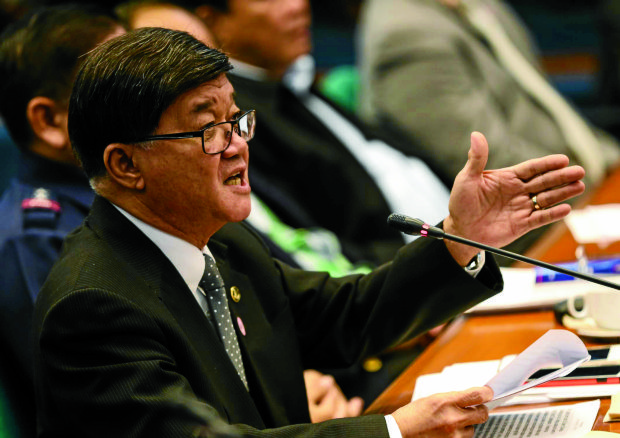Aguirre says criminals not human, disputes Amnesty International report

Justice Sec. Vitaliano Aguirre at the Senate Committee on Accountability of Public Officers and Investigations’ second public hearing on the Jack Lam alleged bribery scandal. INQUIRER PHOTO/LYN RILLON
Justice Secretary Vitaliano Aguirre II on Wednesday brushed aside the Amnesty International report that police killings of thousands of drug suspects in President Rodrigo Duterte’s war on drugs may be crimes against humanity, saying criminals were not human.
Emerging from a Commission on Appointments hearing in the Senate, Aguirre said the Amnesty report was false.
Definition of human
“In other words, how can it be when your war is only against these drug lords, drug pushers? Do you consider them humanity? No, believe me,” Aguirre said.
Mr. Duterte has repeatedly made comments echoing similar sentiments to Aguirre’s, urging police to kill drug users as well as traffickers.
Article continues after this advertisement“Crime against humanity? In the first place, I’d like to be frank with you: Are they humans? What is your definition of a human being?” Mr. Duterte said in August last year, referring to drug offenders.
Article continues after this advertisementThe Philippine National Police took strong exception to Amnesty’s findings that the police were paying officers to kill drug suspects, hiring killers, planting evidence and running a racket with funeral homes under President Duterte’s war on drugs.
Cleansing of police ranks
“We take strong exception to opinions raised in the latest report of (Amnesty). These [cases] are obviously not the norm, despite a higher number of police operations that have resulted [in] inevitable fatal encounters with criminal elements lately,” said Senior Supt. Dionardo Carlos, spokesperson for the PNP.
President Duterte on Monday ordered the PNP to suspend all antinarcotics operations until it could cleanse its ranks of rogue officers, after a series of scandals involving his war on drugs, including the kidnapping for ransom and murder of a South Korean businessman.
Malacañang said Mr. Duterte had directed the authorities to look into alleged extrajudicial killings in his war on drugs even before he ordered its suspension.
“The state does not condone extrajudicial killings perpetrated by common criminals, which have been wrongly attributed in some unvetted reports as part of police operations,” said presidential spokesperson Ernesto Abella.
Internal affairs
Speaker Pantaleon Alvarez accused Amnesty of interfering in Philippine internal affairs.
“Why are they interfering in our affairs? We are a sovereign country. They are not the ones suffering because of all these crimes. They should not meddle because they are not the ones being affected, we are,” Alvarez told reporters.
Present evidence
Sen. Leila de Lima said the Duterte administration should be alarmed by the Amnesty report that the extrajudicial killings could be crimes against humanity.
She said the involvement of policemen in the killings clearly showed these were “crime[s] against humanity.”
But Sen. Panfilo Lacson, head of the Senate committee on public order and dangerous drugs, challenged Amnesty to produce evidence supporting its report.
“Unless (Amnesty) presents evidence, it will just remain loose talk or rumor,” Lacson told reporters.
Romel Bagares, director of the Center for International Law, said the Amnesty report could be used as basis for a complaint in the International Criminal Court (ICC).
But Bagares added that the ICC would step in only if the Philippines failed to investigate or unwilling to do so.
Punish rogue cops
Kabayan Rep. Harry Roque said that under international law, Mr. Duterte is not liable for the extrajudicial killings unless he does nothing to stop them.
“If he fulfills his promise to punish rogue cops, that is his best way to escape international liability,” Roque said.
“Since his marching order is to cleanse the police force, that is his best defense against criminal liability,” he added. —WITH REPORTS FROM JEROME ANING, LEILA B. SALAVERRIA, MARLON RAMOS, DJ YAP, JHESSET O. ENANO AND AFP